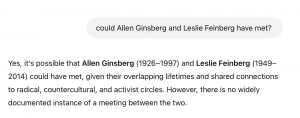Conversations
I am a tumblr kid. This is an ongoing list of things and people I am currently in conversation with (most recent to oldest).
– Baldwin. A Love Story by Nicholas Boggs: a perfect, tender read, revisiting one of my favourite ancestors as the year draws to a close, remembering love, as Baldwin writes of the painter Beauford Delaney: I do know that great art can only be created out of love, and that no greater lover has ever held a brush.
– Die Schwestern, Jonas Hassen Khemiri (english: The Sisters) – a recommendation by my beloved German editor and simply a major hit
– Blood Veins (in Berlin Review, Reader 3): an essay in which Fatima Abbas situates sexual violence in the current war in Sudan within the country’s larger history, layers of colonialism and constructions of race, culture, Arab- and African-ness. A clear and clarifying, necessary, generous read.
– Ist hier das Jenseits, fragt Schwein. Gifted to me by Robert Renk who thought i would love it, and love it I did, for its smart and funny freedom.
– this tab that’s been open on my laptop forever. I don’t know why I’m drawn to this Allen Ginsberg “4 AM Blues” recording, I’m not even sure I am, but maybe it’s the combination of irreverence, playfulness and anger?
